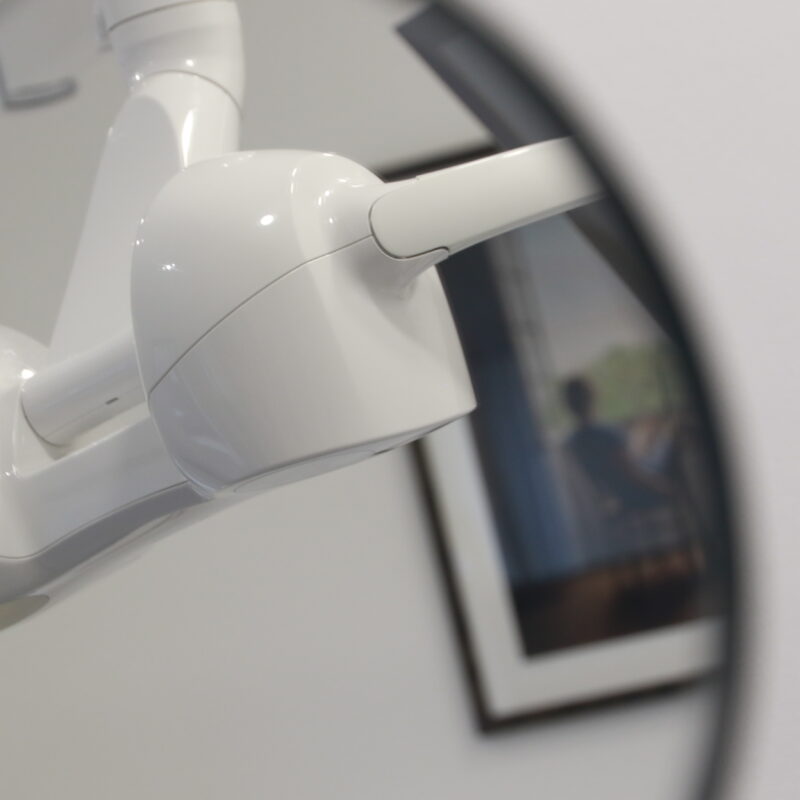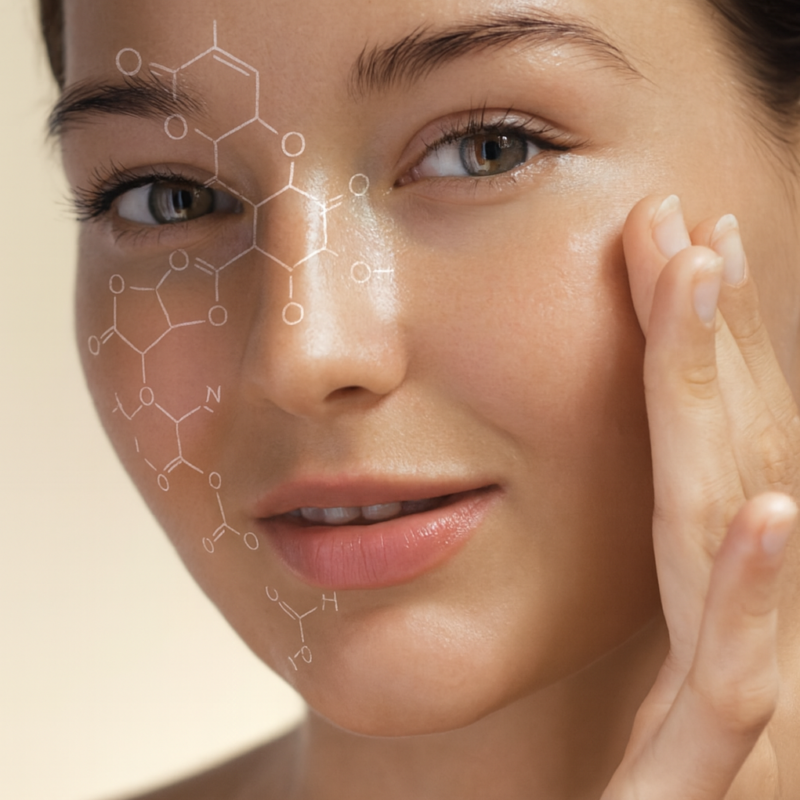
Tooth sensitivity is, in a way, a kind of a toothache, and is very common.
Tooth sensitivity is often caused by the exposure of the tooth's dentine, a porous tissue that is filled with nerve endings. Dentine can be exposed due to:
- Tooth Decay: Cavities and decay can erode tooth enamel, exposing the dentin. As the cavity becomes deeper, the sensitivity tends to increase. Cavities tend to be sensitive to temperature changes (cold and heat) and sweet substances, but when the cavity is very deep almost anything can trigger sensitivity in the tooth, even just a light touch.
- Gum Recession: Receding gums can expose the tooth's roots, which are formed of dentine, and leads to sensitivity. Exposed roots are usually sensitive to temperature changes and touch.
- Cracked Teeth: Hairline cracks in teeth initially expose the nerve endings in the dentine, causing mild to acute sensitivity, usually to temperature changes and sweet substances. As the crack progresses the tooth can be sensitive to bite on, often sharply so, and the sensitivity to temperature changes, and sometimes sweet substances, will continue, and perhaps become worse. Eventually bacteria will enter into the pulp chamber of the tooth, and killing off the nerve and blood vessels, a process which can also be very sensitive, and the sensitivity, particularly to cold, will last much longer after the stimulus is removed. Cracked teeth are often caused by tooth grinding or clenching, which can be habitual or stress related, or may be due to the consumption of stimulants, such as coffee, or other prescribed on non prescribed (recreational) drugs. Cracks can also be due to trauma.
- Chipped Teeth: In the same way that hairline cracks cause sensitivity, when teeth are chipped, if the dentine is exposed, they can become acutely sensitive. Depending on the size of the chip, the sensitivity will vary from slight for a very small chip exposing little dentine, to very acute for a bigger chip. Symptoms will include sensitivity to touch, pressure (biting), hot and cold substances, and even tepid or room temperature foods, liquids, and air. If the chip runs into the nerve chamber of the tooth, it is likely you will experience further symptoms, such as prolonged sensitivity and a throb, or symptoms that come and go without stimulus.
- Worn Down Enamel: Grinding, clenching, or aggressive brushing and some 'whitening' toothpastes can wear down enamel, exposing the dentine and causing sensitivity. Acidic substances both in our diet, and from our tummy, can also cause rapid tooth wear, causing sensitivity. Acidic substances from our diet include any fizzy drink (including carbonated water), citrus fruits, citrus drinks, alcoholic drinks, smoothies, sports drinks, salad dressings, yogurts, and sports drinks. Acid coming back up from our tummy may be reflux, silent reflux or due to a pathology of the tummy, an eating disorder or excessive consumption of alcohol.
- Run Down Teeth: Teeth that have had large restorations may break down and start to become sensitive. They can be sensitive to hot, cold, and pressure. Usually, when in this state, these teeth will need more extensive treatment such as root canal treatment.
- Fractured Teeth: Fractured or chipped teeth tend to be acutely sensitive to touch, and temperature. Often just drawing breath over the tooth will cause sensitivity. The frcatured aspect may have come off, leaving rough edges and a sore gum, but may also be still attached to the gum, making it very sensitive to touch the tooth and sometimes biting fully will not be possible. Other symptoms will be similar to chipped teeth.
- Inflamed, Dead or Infected Teeth: When the blood and nerve supply to a tooth is disrupted, the tooth can become symptomatic. In the initial stages the nerve and blood vessels become inflamed, the tooth can be very sensitive to temperature, such as cold or hot substances, and the pain will linger for at least 10 seconds. The pain may then come on in waves, often without stimulus, though cold and heat are often triggers for sensitivity followed by extended periods of pain. The tooth will also be tender to bite on. Oddly, it may be quite difficult to work out which tooth is causing the symptoms, and people often report that they are not sure which tooth it is or whether it is upper or lower. As the inflammation progresses, the symptoms may actually become less acute, but will probably still come and go until the nerve and blood vessels die off - at this stage the tooth is effectively dead, and infected. The infection causes inflammation around the tips of the roots of the tooth, and this can still cause sensitivity to pressure and temperature changes. Over time an abscess will develop and this will cause chronic and acute symptoms, also including sensitivity to pressure and temperature, though more to heat at this stage.
- After Whitening Treatment: Tooth whitening treatments, particularly those that are performed in the dental surgery, can trigger sensitivity to temperature changes and spontaneous sensitivity - it with no trigger or cause. This type of sensitivity can be very acute, even just to taking a breath of air, but is almost always totally reversible, even just within a few days.
- After Restorative Dental Treatment: Dental treatment such as crowns, fillings, and root fillings can often cause teeth to become mildly or acutely sensitive, sometimes to touch or bite on, though more commonly to temperature changes. If a restoration, eg a filling or a crown, is a little too big, the tooth can also be quite sensitive to bite on. Teeth can be oddly sensitive after root fillings, more often to pressure, but sometimes there can be lingering sensitivity to hot and cold.
- After extractions: Teeth next to an extraction site may be sensitive after the removal procedure.This may be due to the roots of the tooth being exposed, or from trauma during the extraction. Unless the adjacent teeth have been displaced badly, cracked or fractured, this will settle as the wound heals.
- Irregularities With the Bite: We can find that, either through grinding teeth, due to trauma, or eruption of new teeth, we can have 'premature' contacts on one or more teeth, increasing the pressure on that tooth and causing sensitivity, both to touch and often to temperature changes.
- Gum Disease: Gum disease is usually a slower process, though it can be rapid. Part of the process of progression of gum disease will result in gum recession, covered above. As the gum disease advances, teeth can become mobile or wobbly, causing sensitivity on biting, and the gums or teeth can become infected, causing sensitivity to touch and temperature changes.
- Neuralgia: Neuralgia, or Trigeminal Neuralgia or Atypical Facial Pain, can feel as though it may be originating from the teeth, an extraction site or a tooth that has had a root filling, but there is no obvious cause. Often described as an acute stabbing pain, it can feel like sensitivity to touch and temperature, though the teeth are not actually the cause of the pain. This can be very difficult
Why Are My Teeth Sensitive All of a Sudden?
Sudden tooth sensitivity may be triggered by factors such as recent dental procedures, tooth grinding, trauma, whitening procedures and toothpastes, and tooth wear (usually acidic erosion), and sometimes changes in oral care products.
Sudden sensitivity often indicates a rapid process or recent trauma. It could be that the underlying causes have been building over time, such as gum disease, or
Symptoms of Sensitive Teeth
Describing pain is difficult as people feel or understand their pain or symptoms in different ways.
Generally sensitivity would be described as a sudden, sharp pain while eating or drinking hot, cold, sweet, or acidic items. Sensitivity may also be triggered by brushing or flossing, ie touch, or pressure, such as when eating or clenching.
The most common triggers for sensitivity are:
- cold
- heat
- touch
- pressure (biting/eating)
- sweet
- acid (eg citrus fruits, or fizzy drinks)
What To Do If You Have Sensitive Teeth
The most obvious thing is to discuss your issues with your dentist, who can then advise on the next steps.
There are often multiple causes for the sensitivity, which may also be transient. Treating the symptoms is the initial goal, but preventing repeated episodes, disease progression, and more damaging degradation of the teeth as a whole is the main target.
Making a list of the symptoms can be very helpful with the diagnoses, and so can make treating the problem quicker.
As a general guide, here are some tips on how to deal with sensitivity from specific causes:
1. Tooth Decay
Symptoms
- Sensitivity to sweet and cold in earlier stages
- Sensitivity to hot, and pressure (biting) as the decay progresses. May vbe accompanied by a bad taste, or floss catching where it didn't before
- Prolonged sensitivity to cold, hot, and food getting stuck in and around a tooth
Action
- See the dentist as soon as possible
2. Gum Recession
Symptoms
- Sensitivity to sweet, touch (brushing or finger) and cold
- Usually at the gum line
Action
- Use desensitising toothpaste
- See the hygienist for a check of the gums, and instruction on how to clean your teeth without causing further gum recession
3. Cracked Teeth
Symptoms
- Sensitivity to sweet, cold, and pressure
- The sensitivity tends to be transient initially, and can be hard to tell which tooth is the cause, sometimes mixing up upper and lower
- As the crack progresses there will be more persistent sensitivity which may be more acute
- Typically people report sensitivity on catching a tooth in a certain way, or on eating certain foods, like hard bread or seeded breads
- In later stages the sensitivity will become more acute, so that part of the mouth cannot be used for eating or drinking, though the intensity may vary day to day
- When the crack enters the nerve of the tooth, symptoms last longer, with sensitivity to cold or hot lasting over 10 seconds, and often much longer
- The pain on biting is often sharpest just on opening the jaws after closing the teeth together
- Think back for specific traumatic events, such as biting on an olive stone, trauma, or tooth grinding
Action
- See the dentist urgently
4. Chipped Teeth
Symptoms
- Sensitivity to sweet, cold, and touch, such as by a toothbrush, finger, or food
- The sensitivity will always be there
- The tooth may feel rough
- Think back for specific traumatic events
Action
- See the dentist urgently
5. Worn Down Enamel
Symptoms
- Sensitivity to sweet, cold, and touch, such as by a toothbrush, finger, or food
- Sensitivity to acidic substances
- Pain on biting
Action
- Use a desensitising and high fluoride toothpaste
- If symptoms persist more than a few days, check in with your dentist
6. Run Down teeth
Symptoms
- Sensitivity to biting, prolonged response to temperature changes, possible ache
Action
- Discuss next steps with your dentist, treatment will be need, at least a new filling, probably a crown and a root canal treatment
7. Fractured Teeth
Symptoms
- Pain on biting, sensitivity to hot and cold and touch
- The tooth or part of the tooth may feel loose
- The gum may be bleeding
Action
- Urgent dental appointment needed
8. Inflamed, Dead or Infected Teeth
Symptoms
- Sensitivity to cold and pressure, perhaps also heat, persistent ache or bruised feeling
- Later the sensitivity to cold leads to a more delayed and prolonged response lasting over 10 seconds
- It may be difficult to work out which tooth is causing the problem
- The symptoms may vary, usually worse overnight, and better in the morning
Action
- Root canal treatment or a tooth removal procedure needed
9. During or After Whitening Treatment
Symptoms
- Acute sensitivity, particularly to cold
- Random sensitivity with no obvious trigger
Action
- Stop the bleaching procedure and check the prescribed bleach is the correct strength
- Use a desensitising toothpaste
- Place desensitising toothpaste in the bleaching trays and use overnight
- If symptoms persist, go to see your dentist
10. After restorative dental treatment
Symptoms
- The symptoms can vary greatly depending on the treatment type
- Sensitivity to hot and cold after fillings is quite common, sensitivity on biting should settle within a few days, and if it doesn't;t that indicates there could be a crack in the tooth or the filling is a little too big
- Tenderness and sensitivity on biting is quite common after root fillings, and this can last several months
- Sensitivity to hot and cold after a crown, onlay or veneer has been placed is fairly common, especially with some adhesive methods, however this should be short lived, and settle in a few days. Sensitivity on biting and lingering sensitivity to temperature may mean a root filling is needed.
Action
- Monitor the symptoms if not acute, and see if they settle. If not, attend the dentist
- If the symptoms are acute, attend the dentist straight away
11. Sensitivity after extractions
Symptoms
- The symptoms depend on the procedure, but there can be sensitivity to hot, cold, pressure, and a general ache, swelling and bruising. Sometimes there may be pain on biting
- The symptoms should be localised to the area of the extraction
- There may also be some bleeding
Action
- Most of the symptoms, swelling and bruising will start to settle well after 3-4 days
- If at 3-4 days the symptoms are persisting or becoming worse, see the dentist for a review
- If the extraction site is bleeding (mouth will well up full of blood) - see the dentist urgently or go to A & E
12. Irregularities with the bite
Symptoms
- You may have headaches, jaw clicks, difficulty in opening the jaws, sensitivity on biting/ eating
- Some teeth may contact before the rest of the teeth, and the jaw may slide into position, and this may also feel sharp or sensitive
Action
- See the dentist, a specialist prosthodontist will be needed to assess this
13. Gum disease
Symptoms
- Teeth effected by gum disease can have receded gums, and the root can be sharply sensitive to temperature, sweet, and touch
- If the tooth becomes wobbly, it may be sensitive to bite on the tooth
- If there is an infection in the gum, the gum may be tender, bruised, swollen, and sensitive to pressure
Action
- See the dentist, or a periodontist, for an assessment
- Desensitising toothpastes may be effective
14. Neuralgia
Symptoms
- Symptoms often follow dental treatment, such as a root filling or extraction
- There may be sensitivity to pressure, temperature (hot/cold) and biting
- The symptoms are not actually coming form a tooth
Action
- See the dentist for a referral to oral medicine
What is the Best Desensitizing Toothpaste Available in the UK?
Sensodyne Repair and Protect, Colgate Sensitive Pro-Relief, or Arm & Hammer Sensitive Pro Repair are all excellent options.
Which Electric Toothbrush is Good for Sensitive Teeth?
Electric toothbrushes designed for reducing sensitivity are available. Features such as adjustable intensity settings and soft bristles help reduce sensitivity.
Oral B, with its pressure sensor and Sonicare produce excellent toothbrushes. Both brands will have models with more gentle cleaning cycles, and will also provide softer brittle tooth brush heads to reduce the level of abrasiveness.
Using the toothbrush is in the correct way is key, and hygienists or dentists should be able to advise on the best techniques.
Are There Mouthwashes for Sensitive Teeth?
There are desensitising specific mouthwashes available from Sensodyne, Colgate, and Oral B.
Why Are My Front Teeth Sensitive?
Front teeth can be more susceptible to wear and trauma, partially due to their proximity to the mouth's opening, which also makes them more exposed to external stimuli.
What Causes Sensitive Teeth During Pregnancy?
Hormonal changes during pregnancy can affect the gums and increase the risk of sensitivity or symptoms, though this is more likely to be painful (and bleeding gums) rather than a tooth sensitivity.
What Causes Sensitive Teeth After Seeing the Hygienist
Dental hygiene treatments may temporarily increase sensitivity, especially if there's gum recession or exposed dentin, and where there are erosive wear processes ongoing. This type of sensitivity is usually reversible, but may need intervention from the dentist.
What Helps Sensitive Teeth?
Use a soft-bristled toothbrush, and having a good brushing technique.
Maintenance of good oral hygiene.
Fluoride treatments.
Address teeth grinding with a night guard.
Use desensitising toothpastes.
Fluoride treatments at the dentist.
Dental procedures like bonding or root canal treatment for severe cases.
Conclusion
Teeth are so important for our every day enjoyment of life, and being happy within ourselves. Don't let sensitive teeth keep you from enjoying your favourite food and drinks, or from going out or to meet people.
Understanding the causes and symptoms, along with adopting proper oral care practices and using appropriate products, can help manage and alleviate tooth sensitivity. If the issue persists, consult with your dentist for a personalized treatment plan tailored to your specific needs.
More
from the blog
Blog /Advice
Veneers Vs composite bonding
An Evidence-Based Comparison of Two Popular Cosmetic Dental Treatments
Read moreBlog /Advice
Is High-Fluoride Toothpaste Safe?
Benefits, Risks, and How It Protects Against Tooth Decay
Read moreBlog /Advice
Nutritional Effects on Oral Surgery Outcomes
Preparing Your Body for Faster Recovery
Read moreBlog /Advice
PRF facials - Platelet-Rich Plasma
Learn how platelet-rich fibrin treatments naturally restore youthful skin
Read more





